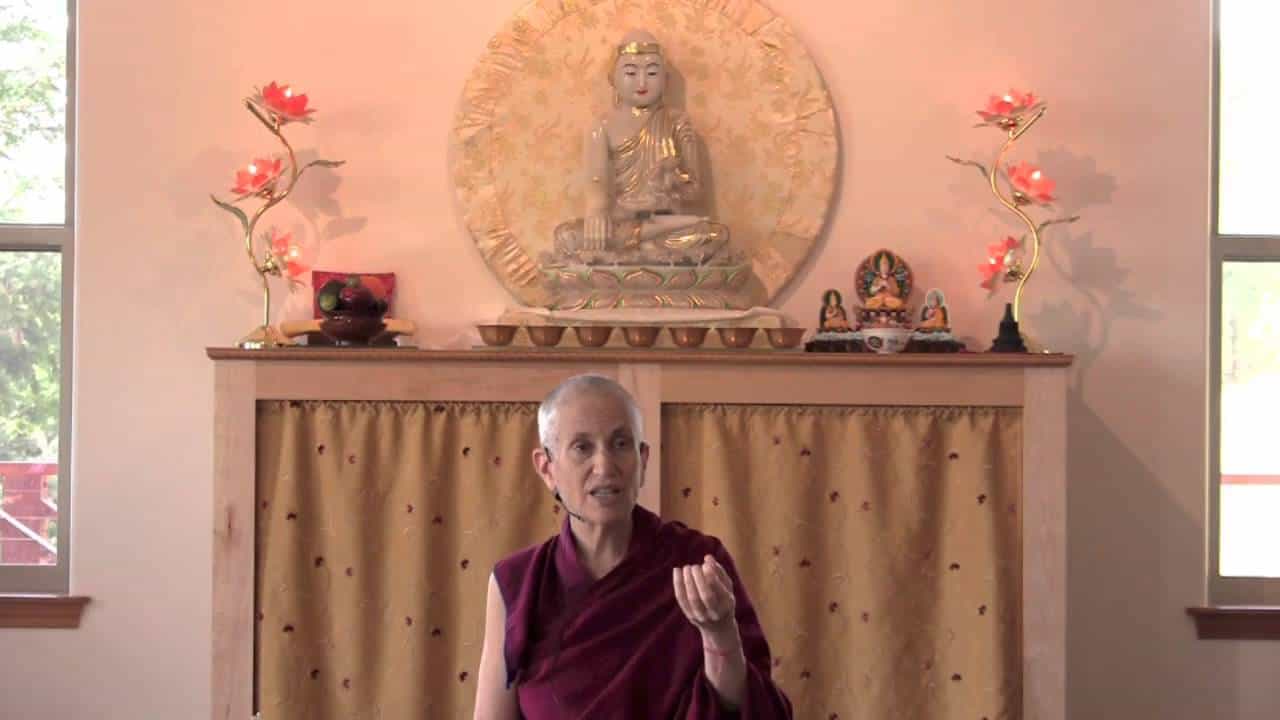The benefits of remembering death
The text turns to reflecting on the impermanence of this life and generating concern for future rebirths. Part of a series of teachings on the Gomchen Lamrim by Gomchen Ngawang Drakpa. Visit Gomchen Lamrim Study Guide for a full list of contemplation points for the series.
- The last three of the ten innermost jewels of the Kadampa tradition
- The three mature attitudes
- The last three of the six disadvantages of not remembering death
- The six benefits of remembering death
- The stories of the deaths of Dharma teachers inspire us to practice
Gomchen Lamrim 12: The benefits of remembering death (download)
Contemplation points
-
- Think about each one of the 10 innermost jewels of the Kadampa and imagine situations where you have the strength of mind to live in this way. What would it feel like to have this kind of fortitude? What are the advantages of thinking in this way and what can you do to cultivate them in your life?
- as our innermost outlook on life, being willing to accept the Dharma with total trust
- as our innermost attitude towards the Dharma, being willing to accept with total trust even becoming a beggar
- as our innermost attitude towards becoming a beggar, being willing to accept with total trust even having to die
- as our innermost attitude towards death, being willing to accept with total trust even having to die friendless and alone in an empty cave
- to go ahead without consideration for what others think
- to keep the constant company of the wisdom of our precepts and commitments
- to carry on continuously without getting caught up in useless concerns
- being willing to be expelled from the ranks of so called “normal people” because we don’t share their limited values
- being willing to be regarded amongst the ranks of dogs
- being completely involved in attaining the divine rank of a Buddha
- Think about each one of the 10 innermost jewels of the Kadampa and imagine situations where you have the strength of mind to live in this way. What would it feel like to have this kind of fortitude? What are the advantages of thinking in this way and what can you do to cultivate them in your life?
-
- The reason we contemplate these 10 innermost jewels is to counter the influence of the Eight Worldly Concerns. Which of the Eight Worldly Concerns do you find most prevalent in your life and how can meditating on these 10 innermost jewels and reflecting on death help you to overcome it?
- Venerable Chodron listed six disadvantages of not thinking about death and six advantages of thinking about death. Consider each of these in depth. Why does thinking in this way overcome our laziness and help us practice?
Disadvantages
- we don’t practice
- if we practice, we put it off
- if we don’t put it off, we don’t practice purely
- we’ll lose energy to practice over a long time
- we will create a lot of destructive karma
- we’ll die with regret
Advantages
- we’ll act meaningfully and won’t waste time
- all our positive actions will be powerful and effective (naturally be more generous and not harm others)
- it gets us going at the beginning of our practice
- it keeps us going in the middle of our practice
- keeps us focused on attaining our goal at the end of our practice
- we die happily and pleasantly
- You have to have a wish to attain awakening that is so strong that you accept whatever comes up and meet it head on. What meditations can you rely on to keep yourself balanced and keep from falling into depression and complacency?
- What expectations do you have of your own practice (constant inspiration and bliss)? Are these realistic? Do you get discouraged when others disrobe or give up their practice or does it inspire you to work harder?
- What does it really mean to benefit others? If you practice well, can you be ok with others being unhappy with you? Even if you did everything that someone wants, would they be happy?
Venerable Thubten Chodron
Venerable Chodron emphasizes the practical application of Buddha’s teachings in our daily lives and is especially skilled at explaining them in ways easily understood and practiced by Westerners. She is well known for her warm, humorous, and lucid teachings. She was ordained as a Buddhist nun in 1977 by Kyabje Ling Rinpoche in Dharamsala, India, and in 1986 she received bhikshuni (full) ordination in Taiwan. Read her full bio.


